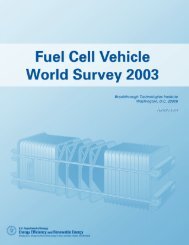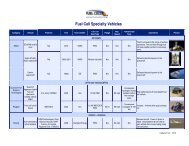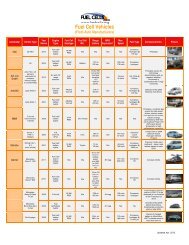Breakthrough Technologies Institute - Fuel Cells 2000
Breakthrough Technologies Institute - Fuel Cells 2000
Breakthrough Technologies Institute - Fuel Cells 2000
You also want an ePaper? Increase the reach of your titles
YUMPU automatically turns print PDFs into web optimized ePapers that Google loves.
Hydrogen fueling station: A Shell service station in N.E. Washington, D.C. has<br />
become the first retail facility in the eastern United States to offer hydrogen as a vehicle<br />
fuel. The facility will support a General Motors fleet of six HydroGen3 fuel cell vehicles<br />
used by the U.S. Postal Service and will be one of three stations in a DC-to-New York<br />
hydrogen corridor. The project is supported by the DC Energy Office.<br />
1. PLANS/STRATEGIES<br />
FLORIDA<br />
H2 Florida<br />
www.dep.state.fl.us/energy/fla_energy/hydrogen.htm<br />
H2 Florida, a statewide program to accelerate the commercialization of hydrogen<br />
technologies, was launched in July 2003. The program partners the state with industry,<br />
local governments and universities.<br />
Hydrogen Energy <strong>Technologies</strong> Act<br />
www.dep.state.fl.us/energy/fla_energy/files/vision.pdf<br />
Florida is developing the Hydrogen Energy <strong>Technologies</strong> Act to facilitate incubation of<br />
emerging technologies and increase government procurement of hydrogen technologies.<br />
Provisions of the Act will include:<br />
• Targeted matching grants to attract corporate investment in demonstration<br />
projects;<br />
• Financial incentives for hydrogen technology companies, including temporary<br />
sales tax exemptions on related equipment purchases and corporate tax<br />
credits for expenditures;<br />
• Uniform standards to accelerate infrastructure siting;<br />
• Establishment of academic-corporate consortia for targeted R&D;<br />
• Geographically-focused infrastructure development, which will include<br />
hydrogen vehicles and fueling infrastructure (Orlando metropolitan Area in<br />
2005-2006 and Tampa metropolitan Area in 2006-2007) and demonstration<br />
of stationary fuel cells statewide;<br />
• Creation of “market pull” through state and local government procurement;<br />
and<br />
• Cost-recovery incentives to utilities for establishment hydrogen electricity<br />
generation and power storage for use as emergency back-up power.<br />
Allotted funding in 2005 was $6 million. In 2006 funding is $15 million, consisting of<br />
$12.9 million to test and demonstrate hydrogen technology and $2.1 million in new tax<br />
incentives. By early 2005, hydrogen technology companies had already received $3<br />
60






